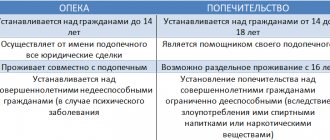© Author of the article: Vladimir Belov If you need free legal advice
, click here
At first glance, the concepts of refusal and non-acceptance of inheritance, which are similar to the common person, actually have a significant difference in the legal field. In relation to the heir to the inheritance, this will be an action or inaction. If the refusal of the property of the testator can be challenged, then non-acceptance cannot be contested. In addition to this difference, there are several others, which can be understood by examining both concepts in detail.
Refusal
On legal grounds, the heir can renounce accepting the inheritance if he does not want to enter into it. This right is enshrined in Art. 1158 of the Civil Code of the Russian Federation.
You can refuse, but there are some special features:
- Meeting the deadline. For refusal, as well as for filing an application for membership, a six-month period is provided, which cannot be exceeded;
- Registration in writing. An application is drawn up in person, submitted independently, by mail or through a representative to an authorized notary;
- Obtaining permission from the guardianship authorities in case of refusal by a minor or a person under guardianship;
- It is permissible to refuse even during actual use of the property. If a certificate of inheritance has already been received, it can only be annulled in court;
- It is not allowed to renounce only part of it, for example, debt obligations, while accepting the house. The law allows one exception when several grounds appear simultaneously (will, succession, transmission). In this case, you can not accept one of them, or all of them. For example, receiving an apartment by will and giving up a car by law.
- You can only renounce property that is subject to inheritance. You cannot demand something else in return for something you don’t like;
- Restoring the right to inheritance in the event of refusal is impossible. Such a decision does not have retroactive force (Article 1157 of the Civil Code of the Russian Federation);
- When renouncing, two methods of registration are allowed, in which you should:
- Indicate the person (circle of persons) in whose favor the refusal is being drawn up. They may be: heirs by law, will (even if not initially considered), representation or transmission;
Important ! By law, it is possible to refuse in favor of an heir only within one line, and in the absence of one, it is allowed in favor of a relative from another line.
If there is a will, the refusal is formalized only within the framework of the “last will” and the persons indicated in it.
- Do not indicate beneficiaries. Then the property is distributed in accordance with the order of the law in proportion to shares, or in a similar way among the relatives specified in the will. Unless a different division of the share of the fallen heir is indicated in the will of the deceased (Article 1161 of the Civil Code of the Russian Federation).
As soon as the application for refusal is completed, the failed heir loses any rights to the property, is released from debt obligations and cannot influence the distribution of the inheritance. The share of such a person is divided among the remaining applicants.
In what cases is an heir recognized as not accepting the inheritance?
If the claiming party is in no hurry to take possession of the property, then it is recognized as inactive. In this case, after the expiration of the period, the heirs, by court decision, are recognized as having refused.
The procedure for removing a claim to inherited property from an heir is shortened if he writes a refusal. Only a document certified by a notary has legal force. The status of renounced inheritance is obtained after the will is read out. Until this moment, it is impossible to refuse bequeathed values.
In Art. 1157 clause 2 of the Civil Code of the Russian Federation states that the recipient has the right to refuse the received values even after their acceptance. If the recipient dies before signing the document, this right passes to his relatives. The expression of will must have a legal basis, i.e. notarized.
Can't refuse
- If there is a will and designation of the procedure for dividing property in the event of the refusal of the main heir and if there is a sub-heir. For example, when the testator determines a “spare” person in the event of the death of the main applicant;
- In case of refusal in favor of an unworthy heir (officially recognized as such);
- Without the consent of the guardianship authorities by persons who require it when renouncing the obligatory share;
- With conditions or reservations;
- After the expiration of the six-month period without judicial permission;
- From a mandatory share “by law” with the transfer of rights to a specific person, property not included in the will;
- The only one indicated in the “last will” in favor of a certain person;
- Partially.
Arbitrage practice
In judicial practice, there are common cases when attempts are made to enter into an inheritance of property that has already been taken possession of by one of the heirs. In this case, the party who accepted the property by law confirms the presence of actions confirming the active use of the inheritance and care of the received property.
The subject of disputes may be a residential building. In the event of becoming an heir, mandatory actions are expected to be taken to pay housing and communal services, debts and other costs of maintaining the house. Carrying out major repairs will be an advantage when disputes arise.
Sometimes an agreement is reached between the parties to renounce legal claims to inheritance. This is necessary to bypass the mandatory tax system. One refuses in favor of the other, thereby the tax is paid by one heir, then the relatives resolve the issue of dividing the property privately by prior agreement.
Relinquishment of ownership in favor of relatives while retaining the right to use may be relevant if the potential heir does not have the means to maintain the resulting property. For example, a brother renounces ownership in favor of his sister, but retains the right to reside in it.
Challenge the refusal
Rarely, but there are situations when it is necessary to challenge the refusal of an inheritance. This could be misleading a person, exerting psychological pressure, or deception. In this case, it is impossible to restore the rights to inheritance from a notary. You need to go to court.
The following nuances are often highlighted as the basis:
- non-compliance with the form of the document (technical errors were made, there is no notarization, personal data is incorrectly indicated);
- violation of deadlines for filing an application, for example, prepared before the date of opening of the inheritance;
- drawing up a document by an unauthorized person (incompetent);
- permission from the representative or guardianship was not observed;
- deception of the applicant when submitting documentation;
- refusal was made under threats or blackmail.
The restoration of rights is carried out by the courts at the place where the inheritance was opened. The initiator of the claim has the right to be any person and the person who refused. The statute of limitations is one year after refusal, and three years to recognize a transaction as void. Upon receiving a positive decision, the heir again goes to court to restore his rights.
Statement of claim for recognition of acceptance of inheritance
In accordance with Art. 1153 of the Civil Code of the Russian Federation, Part 2, it is possible to determine a person recognized as having accepted the inheritance (until proven otherwise) into ownership rights if:
- the fact of use of the property has been established;
- attempts were recorded on his part to protect the received values from the claims of third parties;
- he spends his funds on maintaining the inherited property;
- repaid the debt of the testator or became the owner of funds due to the deceased.
Activities are carried out within 6 months after the decision is announced. This is an advantage for the successor if interested parties appear who claim to receive the bequeathed values.
Actual consent to accept a valuable inheritance is established by the Federal Notary Chamber. Taking possession is certified by a notary. To do this you need:
- Provide the lawyer with documents confirming your taking possession of the property.
- Apply for a Certificate.
The notary issues a supporting document after examining the case. He has the right to refuse if any violations have been identified or there is evidence of fraud. Inheritance acquires a legal basis after the trial. There are 2 options for this type of statement:
- Establishing the fact of acceptance and recognition of the right to inheritance.
- Resolution recognizing the right to property based on the facts presented.
The first type of petition is filed if there is only one heir, or there are no disputes between potential successors. In the second case, in addition to a request to confirm the fact of acceptance of the property, the application contains a substantiation of the claims of the claiming parties and a request for clarification of the share ranking for each participant in the process.
The claim to the court is legal if one of the claiming parties has actually accepted the use of the inherited estate, but this is disputed by a third party.
The claim for acceptance of inheritance has strict regulations and is verified by the court. A claim is a document that must comply with the established procedure.
The introductory part or “heading” of the claim contains:
- information about the court department;
- personal data of the plaintiff;
- information about third parties (addresses and contact details);
- price of the statement of claim;
- title of the article and description block (personal data of the testator, property, information proving the fact of taking possession of the property).
After the main part there are additional information that is important for the court:
- evidence base (list of documents confirming the legality of the claim);
- applications;
- date, month, year of the claim;
- signature.
Sample statement of claim for recognition as having accepted an inheritance
Size: 15 KB
Refusal to accept inheritance
In this case, the successor expresses complete indifference to the inheritance and does not take any action to accept it, that is, he is completely inactive. The period that is provided, as in other inheritance issues, is six months. Thus, if the successor has not submitted an application to enter into the inheritance, he loses his rights to it and they pass to other persons, the circle of whom is permitted by law.
There are cases when a person himself dies without having time to obtain rights to the inheritance of another. In this case, they pass by law or will to other heirs. The concept of such hereditary transmission is contained in Art. 1156 of the Civil Code of the Russian Federation.
When a person receives the property of the testator in an actual manner (not by filing an application), his behavior is considered to be the intention to accept the inheritance. For example:
- the applicant continued or began to manage and own the entitled property (remained living in a shared apartment, carried out repairs, cultivated the land, used a car for earnings, etc.);
- incurred material costs for the maintenance of the inherited property (paid utility bills, made other related payments, etc.);
- repaid the debts of a deceased person, or recovered them from debtors;
- guarded and protected property from unlawful attacks.
Since these actions of the heir are factual in nature and are considered acceptance of the property, the deadline will not be missed. You can refuse such an inheritance only in court, but you must prove the fact of non-acceptance.
Who is the unworthy heir?
The term applies to persons excluded from the procedure as a result of dishonest behavior. All cases are specified in Art. 1117 of the Civil Code of the Russian Federation. The offense must be confirmed by a final court decision or conviction.
At the same time, the norm provides for a rehabilitation mechanism. Thus, you cannot be disinherited in the following situations:
- The decision of the deceased. If, after committing an offense, a citizen indicates an unworthy heir in the will, it will not be possible to remove him from the procedure.
- Eliminating the cause. Thus, parents can achieve restoration of their rights to their child before his death. Persons who maliciously avoided supporting the deceased in the past often correct themselves. They can transfer funds to the testator for many years after the verdict. In this case, the notary's act of disinheritance is challenged in court. The need for a detailed check was stated by the Supreme Court of the Russian Federation in Resolution No. 9 of May 29, 2012.
Any heirs may be considered unworthy. The condition is that there is conclusive evidence of dishonest behavior. If, as a result of deceiving a notary, a citizen acquired property or material benefits, he is obliged to return them in full.
Which heirs can be disinherited?
By written order, a citizen has the right to exclude all family members from the posthumous division of property. The degree of relationship, actual care, oral agreements - all this loses legal significance if there is a direct indication in the will.
Who cannot be disinherited
The freedom of the last will is limited by the requirement of a compulsory share. Thus, you cannot disinherit under a will:
- minor sons and daughters;
- disabled parents, spouses, children;
- other dependents who have lost the ability to provide for themselves.
Whatever the content of the posthumous order, such persons will receive at least half of the property due to them by law (Article 1149 of the Civil Code of the Russian Federation). You cannot disinherit illegitimate children. If the child can prove a genetic relationship, he will be included in the participants.
The exception is the recognition of citizens as unworthy heirs. In this situation, the law allows even recipients of a compulsory share to be disinherited.
The complete ban applies to young children and infants who were in the womb at the time of the death of the parent. The restriction is due to the lack of grounds for recognizing such persons as unworthy heirs. Until the age of 14, citizens cannot become involved in criminal cases or commit civil torts.
Restore deadline
It is allowed to be restored if the potential heir is unaware of the opening of the inheritance, for good reasons, for example, serious illness. And also when proving these circumstances in court within six months from the date of their termination. Pre-trial resolution of the issue is allowed if all other participants in the inheritance are not against the new applicant.
Upon successful resolution, the right is restored and the property is distributed to include an additional successor.









